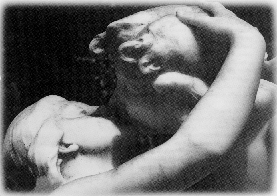

In Beauty and the Beast, Beauty exhibits christian love. The Beast is physically repulsive and frightening; but somehow Beauty manages to see pass his physical exterior. Someone who has been indoctrinated with the ideology of Christianity would be able to accept a monstrous looking creature as the Beast. Christianity teaches its followers to love the afflicted, sick and the ugly. Christianity instills in its followers to love everyone for their spiritual interior and not their physical exterior (Ackerman 47). Even though most of society's members are Christians, very few follow the Christian ideology of "love thy neighbor as thy self (Exodus. 20.3-17)." The wet nurse and Father Terrier, in Perfume, are repelled by Grenouille and put between them as many miles as possible (Suskind 12, 20). Later, we see Baldini's impression of Grenouille when he steps out of the shadows into the light in the perfume shop. Baldini saw a "little deformed person" before him (84). We see the repulsive behavior of Frankenstein when the creature comes to life (Shelley 56). Throughout time people have been judged first by their physical appearance and not their spirituality.
Beauty's fantasizing of the Beast converts him into an ideal lover one with no faults, the perfect lover. Is it healthy to romanticize that a monster or a beast in reality is a prince in disguise? Should we not accept the truth that sometime our lover is really a monster or a beast? Should we be Christians and overlook their faults and mentally replace them with good ones? Beauty's Beast was not perfect and had some inner faults; but she chooses to replace the bad qualities and accept only the good ones. I can relate to romanticizing; because I believe most people use it in their relationships. I, like everyone else, want the perfect lover and we know there is no such person as the perfect anything. Like most of us I romanticize about my lover and put the burden of perfection on him. When he did not live up to my idea of perfection, he became my monster. He was not a monster; the monster was me and my perception of perfection. Grenouille did something similar when he created a scent that would make people fall in love with him (Suskind 188-189). He had romanticized what it would be like and to be loved and how good it would make him feel. On the contrary, when Grenouille was worshipped and loved it did not make him feel good at all. He was very disappointed and hated it (292). On the other hand, Frankenstein was in love with his work and romanticizes about his success over his creation. He did not look at the faults of what he was doing. He too was disappointed with his outcome (Shelley 56).
Beauty's relationship with the Beast was platonic. He was everything a lover was, except there was no sexual contact. This appears to be an ideal relationship, but it really was an escape from rejection and betrayal. A platonic relationship is safe, no pain, no broken hearts and never taking any chances. It is our little safe haven for romantics.
The most important kind of love everyone want including Beauty and the Beast, is unconditional love. This love incorporates all the loves; nothing matters with this kind of love. Unconditional means not subject to conditions; unconditional love means to love, no matter what the person is or what the person becomes, you love that person the same as you did when you first fell in love. It says I love you and accepts everything about you for eternity. We know that this kind of love does not exist. Everything changes with time especially people's emotions. The Beast, Grenouille and Frankenstein's creature wanted unconditional love. It is the ultimate of all loves.
There are so many different concepts of love. It does not matter which one you practice; the only thing that counts is what works best for you and your partner. Maybe a financial bonding fulfills your needs, maybe it is S&M, kundaliri or cannibalism. We all have different needs and fulfillments. Do you know which concept of love fulfills your needs?
Ackerman, Diane. A Natural History of Love. New York: Random House,
1994.
Shelley, Mary. Frankenstein. New York: Penguin Books, 1818.
Suskind, Patrick. Perfume. New York: Knopf, 1986
The Holy Bible. New York: Toronto: Collins, 1952.

The word love is used so freely that it does not have the meaning it should have. We say "I love you" as though it was a salutation. The word lover is used as a sexual partner. When someone introduces a person as their lover it usually means their sexual partner. I thought very hard about what a lover meant to me and this is my meaning of a lover. My lover must first be my friend, trustworthy, honest, compassionate, kind, someone who is in love with me, someone I am in love with, someone I respect and finally someone whom I desire sexually.
I demand a lot from my lover, because I give a lot. I give my complete self and therefore I expect the same thing. When you have a lover you let down your guards and you become very vulnerable. I do not think of a lover as a sexual tool. The sexual part of a relationship is very small aspect of a lover for me. I believe that if everything else is okay the sexual part will take care of itself, because there will be a natural desire and not a mechanical or lustful one. Some women find it hard to separate sexual fulfillment from emotional feelings. Men do not have this problem; sex is sex and that is all it is. Love is love and they do not confuse the two.
Over the years, I have learned to accept man's way of thinking about sex and love. It is a more realistic way of thinking.


In the book, Frankenstein, by Mary Shelley, we get a glimpse of the consequences of man creating life. It was inconceivable and very imaginative to think of man creating life out of an inanimate body in 1816. Today we know that man can do many things; even create life. Shelley intended to write a "chilling, blood curdling, frightening, ghost story; instead, she toppled on something much more than a ghost story." Instead, Shelley gives us an insight into the dangers of man creating life. Should man be allowed to create life, by means other than reproduction? If so, would it be a blessing or a living hell? Frankenstein, was obsessed with being recognized in the science of chemistry, that he forgot morality. He wanted to do something different and something impossible to achieve. He wanted to go further than the other famous chemist before him.
Like Frankenstein, scientists have always been trying to prove some hypothesis. Because of scientist's curiosity we have cures for many deadly diseases, chemotherapy for the treatment of cancer and man's exploration into the galaxy. Scientist's latest discovery this summer was the cloning of a sheep. Many people do not understand the ramification of this. The law forbids the cloning of man. However, we must be realistic and honest, man is a very curious creature; he is always looking to achieve the impossible and recognition. Even though the law forbids cloning of man, somewhere there is a scientist in his or her laboratory trying to achieve the impossible.
During the Nazi reign, many Jews were experimented in the name of science; because of these horrible experiments we have skin grafting, transplants and other surgical procedures we use so readily today. Many people died to satisfy the scientist curiosity. When we read about transplants or skin grafting, do we think of how it came about, or how many people where killed trying to prove a hypothesis? Every time I hear of someone having plastic surgery or a transplant, I cringe at the thought of how many human guinea pigs where used without anesthetics to perfect these procedures. Yes, the Nazi used their captures for trail and error experiments; prisoners where peeled, cut and pasted together like a jigsaw puzzle. The mutilated or dead carcass was disposed of, as if it were scrap meat; instead of human beings.
Today we have cloning and how many human guinea pigs will it take to perfect the cloning of man? There will be many imperfect clones before perfection are reached. What will happen to the imperfect ones? Well, in the past they were disposed of and why not now? Do we think that the scientist will let deformed or incomplete copies of man loose for people to see? Scientists do not want people to think of them as monsters; so the imperfections will not be allowed to exist. Because the scientist's purpose of cloning is to produce perfect human beings and not nature's mistakes. Hitler lives again, but this time in the name of science.
It is sad that people really believe that the scientist is going to obey the law against the cloning of man. They cannot obey that law; because they hope man will be grateful and give them one of the highest awards of recognition for their discovery.
Shelley, Mary. Frankenstein. New York: Penguin Books, 1818.